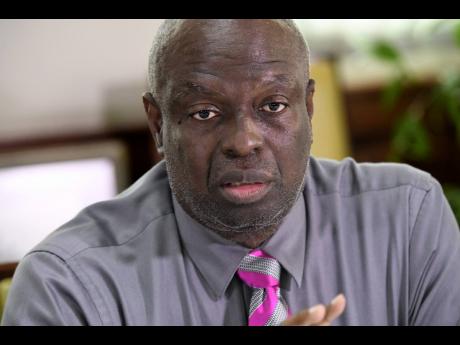James: Mechanism needed to boost universal access to quality healthcare
With a review of healthcare financing in Jamaica under way, at least one local medical practitioner is in support of the continuation of the no-user-fee policy in the country’s public health system.
Medical Association of Jamaica President Dr Brian James told a Gleaner Editors’ Forum on Tuesday that, unlike many of his colleagues, he has no objection to the policy itself.
“What I have a problem with is the lack of commensurate funding. When we removed the user fees, we ended up with overflowing wards. What that means is that, before the user fees were taken away, all of those people who needed to be admitted were not coming to hospital because they could not afford it,” James said.
He was countered by chief technical director of policy in the health ministry, Howard Lynch, who explained that the revenue lost by removing user fees in the public health system was replaced in the Budget.
“So $2 billion collected in fees and it was replaced by over $3 billion in the Budget. It may not have been enough, but it was replaced,” Lynch said.
James said that, coming out of the review now under way, there needs to be a mechanism to implement universal access to quality healthcare and financial protection for the society.
Economist Dr Damien King is leading the review and is expected to deliver his report in June 2023.
In the 1980s, a number of developing countries introduced user fees as a means of improving the quality of their healthcare systems and increasing utilisation of services.
After 24 years of user fees in public hospitals, on April 1, 2008, the Government of Jamaica introduced a no-user-fee policy at all public health facilities across the island, except the University Hospital of the West Indies, to improve universal access at the primary care level.
A Caribbean Policy Research Institute health access study was conducted five years later, following concerns about the State’s ability to adequately fund quality care across the public health system.
Doctors and nurses had outlined that the abolition of user fees had its most far-reaching impact on pharmaceutical supplies, followed by staff and medical supplies.
During Tuesday’s forum, Health and Wellness Minister Dr Christopher Tufton spoke of the continued rise in the cost of pharmaceuticals.
The minister said a close look at the budget of the National Health Fund (NHF) shows that costs have escalated by 139 per cent over the last seven years.
Some $4.6 billion was spent in the 2015-16 financial year and that amount rose to $11 billion in the 2021-22 financial year, to include adjustments for COVID-19.
Projections for the next three years suggest further increases of approximately 30 per cent, or $12.754 billion, in 2023; some $13.391 billion in 2024; and $14.061 billion in 2025.
“Costs are high and are getting higher, but what is interesting is the cost to individuals – the co-payments. Those costs have also been going up. So, from the standpoint of the people’s ability to afford, the truth is it is hitting them harder in the pocket,” Tufton said.
The minister referenced a 2016 report which found that a third of the Jamaican population has no access to healthcare.
“There are people who, even with universal access, are being denied the best possible care for one reason or the other, or, even if they try, they are going to be denied the children’s lunch money or the utility bills or the food that they need for nutrition, because it’s a choice they have to make, and these are real choices,” Tufton said.

